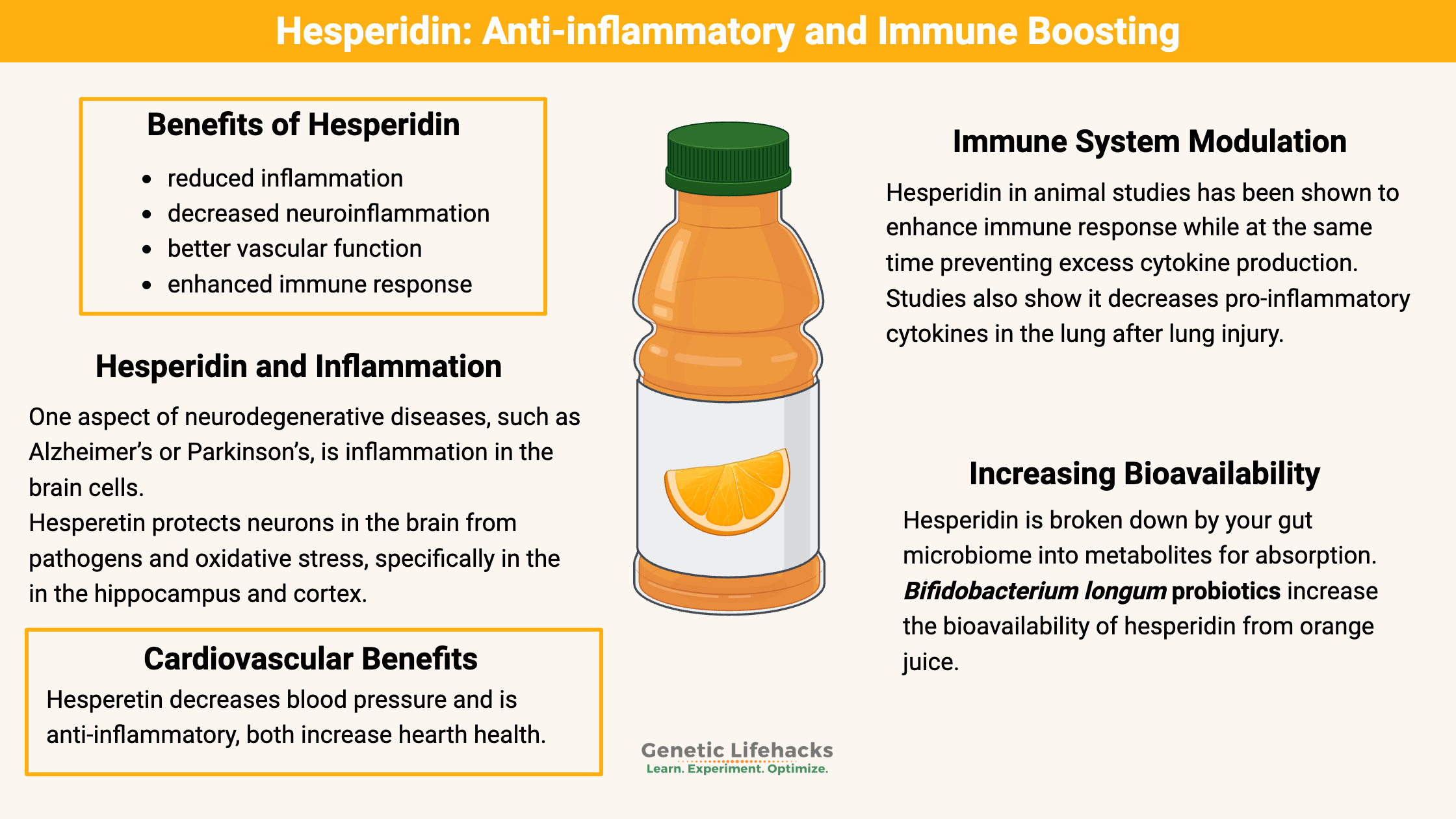Key takeaways:
~ The anti-inflammatory flavonoid found in citrus called hesperidin may help with cardiovascular health and prevent neuroinflammation.
~ People with genetic variants related to higher TNF alpha may benefit from hesperidin’s TNF lower effect.
~ Studies show that hesperidin may be beneficial for neurodegenerative diseases.
What is hesperidin?
Hesperidin is a flavonoid found in citrus fruits. Its active metabolite is hesperetin, and you will see both mentioned almost interchangeably in studies. Orange juice contains 200-600 mg/L of hesperidin, making up about 90% of the flavonoid content.[ref]
The benefits of hesperidin include:[ref]
- reduced inflammation
- decreased neuroinflammation
- better vascular function
- enhanced immune response
- decreased triglycerides
Let’s dig into the details of the studies on hesperidin.
Hesperidin Reduces Neuroinflammation
A clinical trial of hesperidin-enriched orange juice (vs an orange-flavored drink) improved cognitive function in older adults.[ref]
Why would a flavonoid affect cognitive function in aging? One driver of cognitive decline and neurodegenerative diseases, such as Alzheimer’s or Parkinson’s, is inflammation in the brain cells. This neuroinflammation involves certain cell types, such as astrocytes and glial cells, which protect the neurons from insults.[ref]
There are several possible causes of neuroinflammation, including pathogens and oxidative stress. Sources of oxidative stress can include heavy metals, pollution, smoking, mold exposure, viral infections, and more.
An in vivo and in vitro study investigated hesperidin’s effects on neuroinflammation. The lipopolysaccharide-induced neuroinflammation was decreased with hesperidin, which was shown to modulate TLR4 and NF-kB signaling. [ref]
Recent animal studies and cell studies show that hesperetin protects neurons in the brain from pathogens and oxidative stress. Specifically, hesperetin decreased TNF-α and TLR4 (inflammatory cytokines). It reduced reactive oxygen species (ROS) in the hippocampus and cortex.[ref]
Several studies on Parkinson’s disease show promise for hesperidin in animal models.[ref]
Cardiovascular benefits of hesperidin
Animal studies clearly show that hesperetin decreases blood pressure and is anti-inflammatory, thus benefiting the heart.[ref][ref]
As usual, human studies aren’t quite as clear-cut as the animal studies.
- One study using orange juice with increased flavonoids found that it helped vascular function after a meal.[ref]
- Another placebo-controlled study found that hesperetin increased vascular function and decreased inflammatory biomarkers.[ref]
- A double-blind clinical trial in people with diabetes found that hesperidin (500 mg/ day) decreased blood pressure, IL-6, and CRP levels.[ref]
- A 12-week trial of hesperidin in orange juice showed that it decreased blood pressure and also downregulated proinflammatory genes.[ref]
Metabolic syndrome studies using hesperidin
Hesperidin supplements (500 mg, 2x a day) reduced fasting glucose, blood pressure, triglycerides, and TNF-α in a placebo-controlled trial on people with metabolic syndrome.[ref]
Another clinical trial using 1g/day of hesperidin also showed decreased triglycerides and lower blood pressure.[ref] And yet another clinical trial with 1g/day also found that hesperidin reduced blood glucose, triglycerides, and LDL.[ref]
Fatty liver disease (NAFLD)
A 12-week trial of 1g/day of hesperidin resulted in lower triglycerides, decreased liver fat, and lower inflammatory cytokine markers.[ref]
Immune system modulation
Hesperidin in animal studies has been shown to enhance immune response while at the same time preventing excess cytokine production.[ref][ref]
Additional animal studies show that hesperidin also decreases pro-inflammatory cytokines in the lung after lung injury.[ref]
Preliminary studies in chronic rhinosinusitis show that hesperidin increases mucosal clearance. This is being looked at for people with cystic fibrosis mutations.[ref]
Cancer proliferation inhibition
Numerous studies (mostly animal and cell studies) show that hesperidin inhibits cancer cell proliferation. There are current studies underway investigating the addition of hesperidin to chemotherapy regimens.[ref][ref][ref]
SARS-CoV-2 and SARS-CoV inhibition: Hesperidin studies
Related Genes and Topics:
TNF-alpha: Inflammation and Your Genes
Do you feel like you are always dealing with inflammation? Joint pain, food sensitivity, etc? Perhaps your body genetically gears towards a higher inflammatory response. Tumor necrosis factor (TNF) is an inflammatory cytokine that acts as a signaling molecule in our immune system. In an acute inflammatory situation, TNF-alpha plays an essential role in protecting us.
Should you increase your vitamin C intake? Genetics and vitamin C absorption
Vitamin C is often the first supplement most of us reach for when getting sick. Whether upping the OJ or going with a supplement, vitamin C is known for its ability to boost the immune system. It turns out, though, that vitamin C is important for more than just ‘cold and flu season’, and higher levels of vitamin C intake may protect against cardiovascular disease, gastric cancer, and neurodegenerative disorders.
Long Covid: Research Studies and Potential Causes
Learn about the current research on the physiological causes of long Covid.

